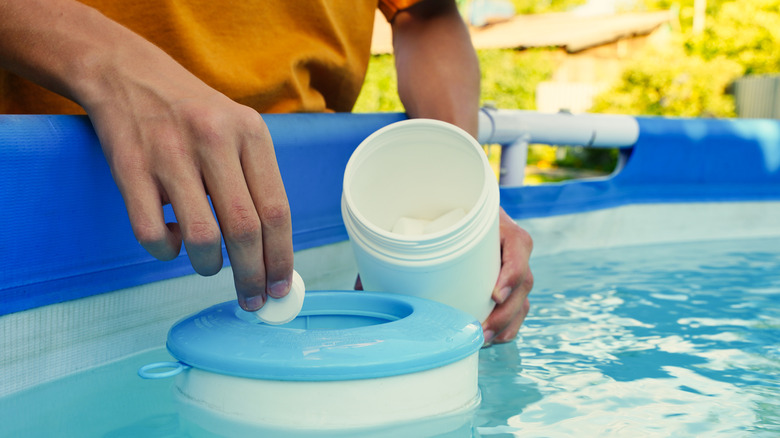The Unexpected Effect Chlorine Has On Your Health
Chlorine plays a large role in the manufacturing of many different products within the United States (via the U.S. Centers for Disease Control and Prevention). Among these products are paper, cloth, rubber, and pesticides. In addition, chlorine is added into both drinking water and swimming water in order to kill off potentially dangerous bacteria that could pose harm to our health.
After a cool dip in a chlorinated pool, you've likely experienced the effects of chlorine for yourself. Red eyes, dry skin, and hair that's crunchy to the touch are all common, mild side effects in response to chlorine exposure from swimming pools (via Live Science). Overexposure to the chemical can pose significant health risks, particularly in the form of a gas. However, there's no need to cut short your summertime fun. "If you're in a pool situation, in general, it's safe," Dr. Ana Duarte, director of dermatology at Nicklaus Children's Hospital, told Live Science.
The CDC recommends that chlorine levels in swimming pools be kept above 1.0 parts per million (PPM), while The Association of Pool and Spa Professionals suggests chlorine levels reside between 2.0-4.0 PPM (via Pool and Spa Resources LLC). Because levels of added chlorine may vary from pool to pool, you'll want to be mindful of swimming in over-chlorinated pools, as doing so may have a surprising effect on your health.
The link between chlorinated swimming pools and breathing problems
According to experts at WebMD, swimming in chlorinated pools may cause difficulty breathing. A 2004 study examined 41 trained swimmers and found that those who swam in pools with high concentrations of chlorine for as little as 6 minutes experienced exercise-induced asthma (via WebMD). Researchers concluded that regardless of whether or not swimmers had a medical history of breathing problems, the risk for exercise-induced asthma tripled for those who swam in pools with chlorine levels exceeding 1 PPM.
Additionally, a 2008 study published in the European Respiratory Journal determined that the more lifetime hours spent in outdoor chlorinated pools, the higher the risk for asthma in adolescents. Interestingly, additional findings indicated that outdoor residential pool usage by adolescents also increased the likelihood of allergies to household allergens, such as cats and dust mites.
However, this doesn't mean you have to write off swimming pools altogether. "We believe these hazards can be minimized through awareness and proper pool maintenance," Dr. Arthur J. Williams of the Sport Science Institute of South Africa told WebMD. For example, researchers suggest keeping chlorine levels in swimming pools below 0.5 PPM.


